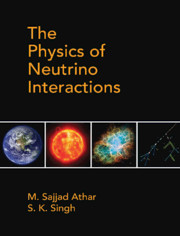Book contents
- Frontmatter
- Dedication
- Contents
- List of Figures
- List of Tables
- Preface
- Acknowledgments
- Chapter 1 Neutrino Properties and Its Interactions
- Chapter 2 Relativistic Particles and Neutrinos
- Chapter 3 Quantization of Free Particle Fields
- Chapter 4 Interacting Fields and Relativistic Perturbation Theory
- Chapter 5 Phenomenological Theory I: Nuclear β-decays and Weak Interaction of Leptons
- Chapter 6 Phenomenological Theory II: Weak Decays of Hadrons
- Chapter 7 Gauge Field Theories and Fundamental Interactions
- Chapter 8 Unified Theory of Electroweak Interactions
- Chapter 9 Neutrino and Electron Scattering from Point Particles
- Chapter 10 Neutrino scattering Cross Sections from Hadrons: Quasielastic Scattering
- Chapter 11 Neutrino Scattering from Hadrons: Inelastic Scattering (I)
- Chapter 12 Neutrino Scattering from Hadrons: Inelastic Scattering (II)
- Chapter 13 Neutrino Scattering from Hadrons: Deep Inelastic Scattering
- Chapter 14 Weak Quasielastic v(⊽)-nucleus Scattering
- Chapter 15 Inelastic Scattering of (Anti)neutrinos from Nuclei
- Chapter 16 Deep Inelastic Scattering of (Anti)neutrinos from Nuclei
- Chapter 17 Neutrino Sources and Detection of Neutrinos
- Chapter 18 Neutrino Mixing and Oscillations
- Chapter 19 Neutrino Astrophysics and the Synthesis of Elements
- Chapter 20 Neutrino Interactions Beyond the Standard Model
- Appendices
- Appendix A Lorentz Transformation and Covariance of the Dirac Equation
- Appendix B Cabibbo Theory
- Appendix C Some Properties of Pauli and Dirac Matrices and Spin Density Matrices
- Appendix D Leptonic and Hadronic Tensors
- Appendix E General Expression for the Total Scattering Cross Section and Decay Rates
- Appendix F Expressions of N(q2), the Coefficients of the Polarization Observables
- References
- Index
Chapter 19 - Neutrino Astrophysics and the Synthesis of Elements
Published online by Cambridge University Press: 22 May 2020
- Frontmatter
- Dedication
- Contents
- List of Figures
- List of Tables
- Preface
- Acknowledgments
- Chapter 1 Neutrino Properties and Its Interactions
- Chapter 2 Relativistic Particles and Neutrinos
- Chapter 3 Quantization of Free Particle Fields
- Chapter 4 Interacting Fields and Relativistic Perturbation Theory
- Chapter 5 Phenomenological Theory I: Nuclear β-decays and Weak Interaction of Leptons
- Chapter 6 Phenomenological Theory II: Weak Decays of Hadrons
- Chapter 7 Gauge Field Theories and Fundamental Interactions
- Chapter 8 Unified Theory of Electroweak Interactions
- Chapter 9 Neutrino and Electron Scattering from Point Particles
- Chapter 10 Neutrino scattering Cross Sections from Hadrons: Quasielastic Scattering
- Chapter 11 Neutrino Scattering from Hadrons: Inelastic Scattering (I)
- Chapter 12 Neutrino Scattering from Hadrons: Inelastic Scattering (II)
- Chapter 13 Neutrino Scattering from Hadrons: Deep Inelastic Scattering
- Chapter 14 Weak Quasielastic v(⊽)-nucleus Scattering
- Chapter 15 Inelastic Scattering of (Anti)neutrinos from Nuclei
- Chapter 16 Deep Inelastic Scattering of (Anti)neutrinos from Nuclei
- Chapter 17 Neutrino Sources and Detection of Neutrinos
- Chapter 18 Neutrino Mixing and Oscillations
- Chapter 19 Neutrino Astrophysics and the Synthesis of Elements
- Chapter 20 Neutrino Interactions Beyond the Standard Model
- Appendices
- Appendix A Lorentz Transformation and Covariance of the Dirac Equation
- Appendix B Cabibbo Theory
- Appendix C Some Properties of Pauli and Dirac Matrices and Spin Density Matrices
- Appendix D Leptonic and Hadronic Tensors
- Appendix E General Expression for the Total Scattering Cross Section and Decay Rates
- Appendix F Expressions of N(q2), the Coefficients of the Polarization Observables
- References
- Index
Summary
Introduction
Neutrinos play a very important role in astrophysics. Due to their weaklyinteracting nature, they give information about the interior of stars,supernova explosions, the distant galaxies, the possible origin of thecosmic rays, etc. In Chapter 17, we have observed that astrophysical sitesare the major contributors to low energy neutrinos. In this chapter, wediscuss the importance of neutrinos in the creation of the chemical elements(see Figure 19.1) in the universe. We know that the universe started around13.8 billion years ago with a singularity, that is, Big Bang and since then,it has been expanding and becoming cooler. The very early universe consistedonly of radiation, which during the expansion and cooling phase gave rise toquark–antiquark and lepton–antilepton pairs. With further fallin temperature, the quarks combined to form
nucleons, which in turn fused to form the lighter elements like hydrogen,helium, and lithium, the first ever nuclei created in the universe. Thus,the early universe consisted of about 75% hydrogen nuclei, 25% heliumnuclei, and traces of lithium nuclei. It should be noted that hydrogen isthe only element that was solely created during the Big Bangnucleosynthesis; all the other elements including helium and lithium aresynthesized by several processes as shown in Figure 19.1. Therefore, all thehydrogen in water molecules were produced during the first few minutes ofthe Big Bang.
The process of creation of new nuclei from pre-existing nucleons is known asnucleosynthesis. The nucleosynthesis of the lighter elements does notrequire the emission or absorption of neutrinos while all the elementsheavier than lithium require neutrinos directly or indirectly in theirsynthesis. The nucleosynthesis of intermediate and heavy elements require avery high temperature and pressure environment. Elements up to iron were/aresynthesized in the core of stars through the nuclear fusion reaction and itis believed that the heavier elements were synthesized outside the newlyformed neutron star in a core collapse supernova. Without neutrinos, wecannot think of energy from the stars. Moreover, neutrino properties figureprominently in many astrophysical environment. Neutrinos are involved indifferent types of nucleosynthesis processes like theν-process, νp-process,etc., in the creation of proton-rich nuclei as well as in the synthesis ofneutron-rich nuclei through the r-process and s-process.
- Type
- Chapter
- Information
- The Physics of Neutrino Interactions , pp. 749 - 774Publisher: Cambridge University PressPrint publication year: 2020



